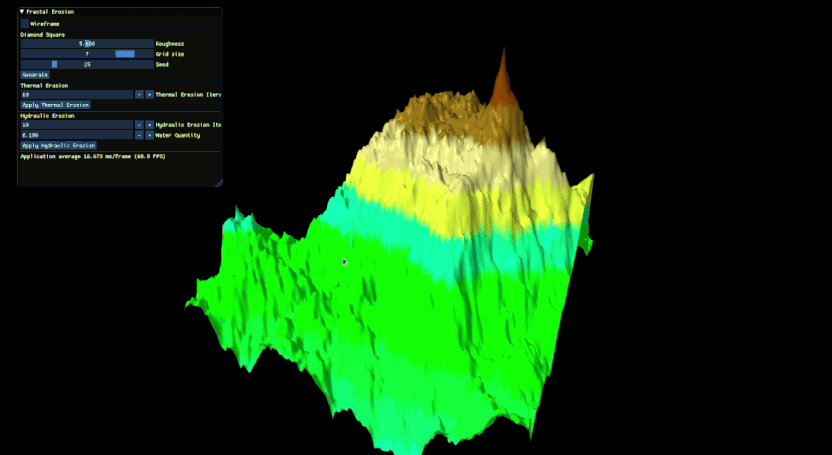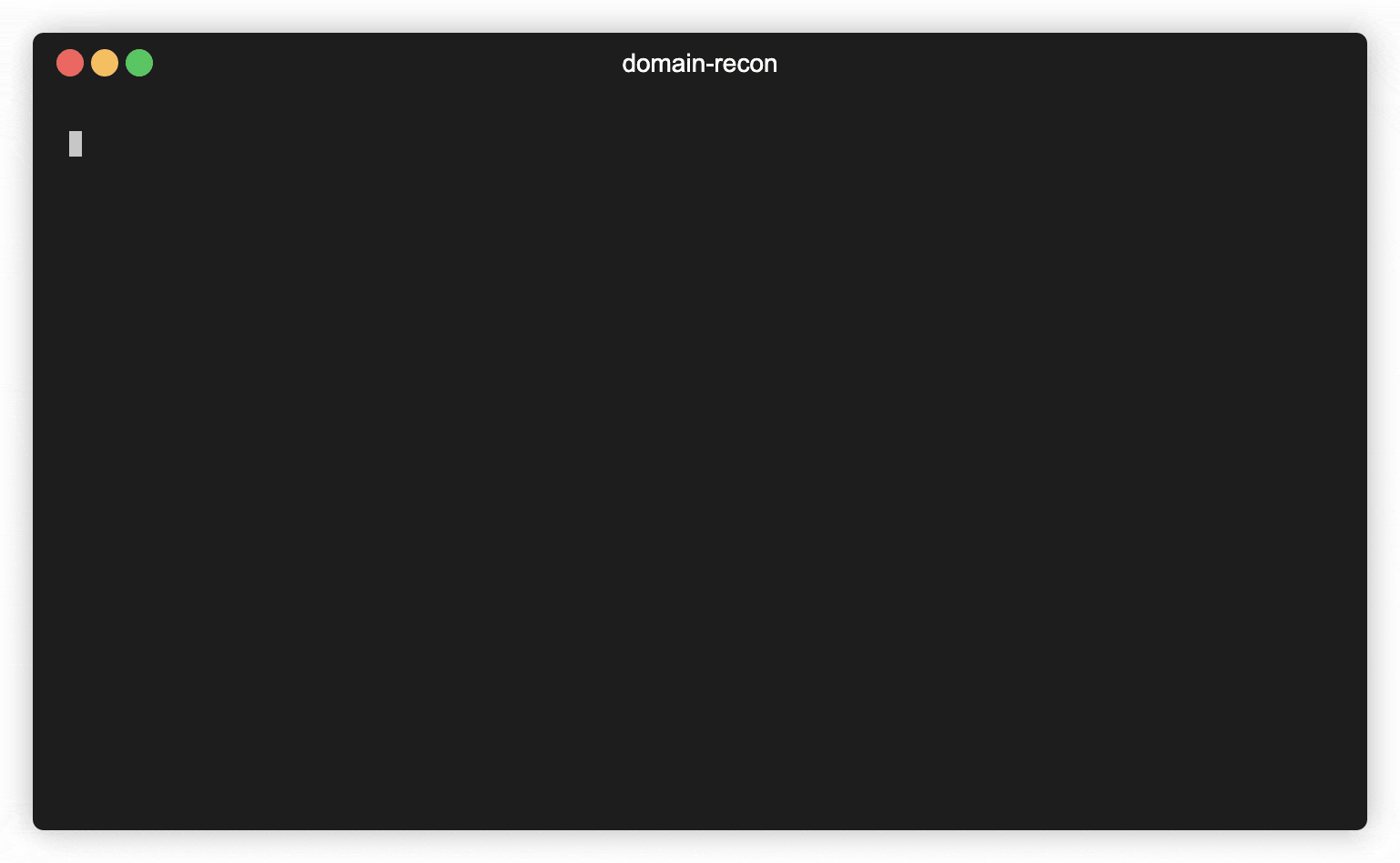Projects
DelaunayImage<<
The goal of this small project was to create a tool which can generate artistic bitmap and/or vector graphic (.svg) images using Delaunay triangulation algorithm. I wrote a full article about this project, which can be found here.
Example of a generated image:

- Technologies used: Java, OpenCV
- Source code: https://github.com/Ernyoke/DelaunayImage
Fractal Erosion<<
The goal of this project was to procedurally generate 3D terrain using Diamond-square fractal algorithm. At first I implemented this using C++17 with OpenGL, then I decided to give a shot and implement it using JavaScript and WebGL, which be seen in action here.

- Technologies used: C++, OpenGL, JavaScript, WebGL
- Source code for native C++ implementation: https://github.com/Ernyoke/fractal-erosion
- Source code for web implementation: https://github.com/Ernyoke/fractal-erosion-webgl
- Try out the JS implementation here: https://ervinszilagyi.dev/fractal-erosion-webgl
Imger<<
Imger is a collection of image processing algorithms implemented in Go. Example of algorithms:
- Grayscale
- Blend algorithms: AddScalarToGray, AddGray, AddGrayWeighted
- Thresholding algorithms: Binary, BinaryInv, Trunc, ToZero, ToZeroInv, Otsu
- Image padding: BorderConstant, BorderReplicate, BorderReflect
- Convolution
- Blur algorithms: Average - Box, Gaussian
- Edge detection algorithms: Sobel, Laplacian, Canny
- Resizing algorithms: Nearest Neighbour, Linear, Catmull-Rom, Lanczos
- Effects: Pixelate, Sepia, Emboss, Sharpen, Invert
- Transform algorithms: Rotate
- Generate Gradients: LinearGradient, SigmoidalGradient
Technology stack:
- Technologies used: Go
- Source code: https://github.com/Ernyoke/Imger
BlueSky Bots<<
bsky-aws-community-builder-blogposts - AWS Community Builder Blog Posts
It is a bot that re-shares blog posts authored by AWS Community Builders from dev.to/aws-builders.
- Technologies used: TypeScript, AWS Lambda, Terraform
- Source code: https://github.com/Ernyoke/bsky-aws-community-builder-blogposts
bsky-aws-heroes-blogposts - AWS Heroes Blog Posts
Similarly to bsky-aws-community-builder-blogposts, it is a bot that re-shares blog posts authored by AWS Heroes from dev.to/aws-heroes.
- Technologies used: TypeScript, AWS Lambda, Terraform
- Source code: https://github.com/Ernyoke/bsky-aws-heroes-blogposts
bsky-aws-news-feed - AWS News Feed on 🦋
It is a bot that watched the RSS feed provided by AWS (http://aws.amazon.com/new) and re-shares the latest AWS cloud news on BlueSky.
- Technologies used: TypeScript, AWS Lambda, Terraform
- Source code: https://github.com/Ernyoke/bsky-aws-news-feed
bsky-aws-blogs
This project serves to BlueSky Bots:
- AWS Blogs on 🦋: it is an aggregate of all the blog posts from AWS employees and partners.
- Deprecated by AWS: it is an aggregate for blog posts that talk about service and feature deprecations on AWS.
The project uses an event-driven approach:
- The Fetcher Lambda function runs on a schedule and retrieves all newly created blog posts. For each blog post, a new event is published to an SNS topic.
- There are two SQS queues listening to these events: one for the AWS Blogs Lambda function and the other for the Deprecations Lambda function.
- The AWS Blogs Lambda function simply re-shares everything on BlueSky.
- The Deprecations Lambda function uses LLM models to detect if the blog post mentions any service or feature deprecation. If the blog post is about a deprecation, it will also be re-shared on BlueSky.
Technology stack:
- Technologies used: TypeScript, SNS, SQS, AWS Lambda, AWS Bedrock (AWS Titan, Anthropic Claude Haiku provided by Bedrock), LangChain, Terraform
- Source code: https://github.com/Ernyoke/bsky-aws-blogs
Recon Tools<<
domain-recon
domain-recon is a tool which can be used for passive host reconnaissance. It helps extend the attack surface by fetching all the available active certificates for the host. Using certificate parsing, it extracts all available domains from “Common Name” and “Matching Identities” fields. Moreover, in a lot of cases, it may encounter certificates issued for wildcard domains (example: *.example.com). For these domains, it can use a word list to extend these wildcards by filling in words from the list and generate new potential subdomains.

Read the full article here: Certificate Parsing with domain-recon
- Technologies used: Rust
- Source code: https://github.com/recon-tools/domain-recon-rs
simple-port-scanner (sps)
It is exactly what the name of the app says, a simple port scanner written in Rust. It is cross platform, it does TCP SYN or full TCP connect scans on hosts. It supports host discovery with TCP PING, ICMP PING and UDP PING. It is aiming to be simple to use and fast.
- Technologies used: Rust
- Source code: https://github.com/recon-tools/simple-port-scanner-rs
cert-ripper
cert-ripper is tool for retrieving the certificate chain for a hostname or URL. The certificates from the chain can be simply printed out in an OpenSSL format to the standard output, or they can be saved in a folder in different formats (PEM, TXT - OpenSSL, DER, etc.)
- Technologies used: Go
- Source code: https://github.com/recon-tools/cert-ripper-go
Static Site Generator (ssg) + This Site<<
At a certain point I wanted to have my own personal site where I can share and document what I am working on and my own experience about tech. My idea was to write everything in simple markdown files and transform them to static HTML pages. Although there are many existing solutions out there, I found everything either way too complicated to learn or having way more overhead than what I need. I decided to write a simple Python script, which can transform markdown pages to HTML. That is how ssg was born. It is opinionated, developed mainly for this site and not intended to be used by everyone else. But it works for me, which is good enough…
- Technologies used: Python
- Source code: https://github.com/Ernyoke/ssg